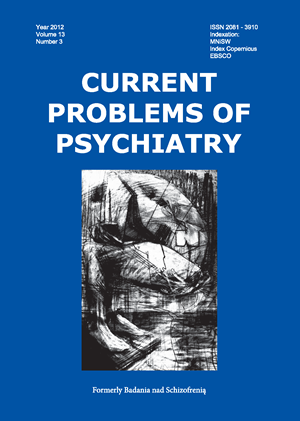Internet use intensity by high school adolescents versus their functioning at school
Keywords:
Internet, adolescents, schoolAbstract
Due to an increasing number of adolescents addicted to the Internet and showing a risk of developing such an addiction, an attempt has been made in the present article to answer the following research problems:
In what way do adolescents use the Internet and are there any worrying symptoms of their activity? Does the gender differentiate the intensity of the Internet use?
Does the Internet use affect functioning students at school and if so, in what way?
We tried to answer the above problems based on the analysis of the research involving 136 high school students by using a questionnaire that was designed for this particular purpose. The research results demonstrated worrying symptoms shown by the examined adolescents pointing to the risk of developing the Internet addiction. It is the boys who are more prone to the addiction as compared to the girls. The intensity of Internet use affects functioning of students at school. Frequent staying online for long hours at night makes some students sleepy during the classes at school. One fourth of the high school students admit that their performance at school is often lowered as a result of spending too much time on the web and almost every tenth student admits having missed school due to being online.
References
1. Adamiec R., Walkowiak T., Woda M. Efektywne tworzenie e-wykładów. W: Jurek H. red., Nowe Media w edukacji 2008: zastosowania technik informacyjnych i komunikacyjnych w kształceniu. Wrocław; Oficyna Wydawnicza Politechniki Wrocławskiej: 2008 s.7-13.
2. Wieczorkowski K. Nauczanie na odległość: stan obecny i perspektywy rozwoju. W: Siemieniecki B. red., Perspektywy edukacji z komputerem. Toruń; Wyd. Adam Marszałek: 1996 s.107-142.
3. Bobrowicz W. Internet, kultura, edukacja. Lublin; Oficyna Wydawnicza Verba: 2006.
4. Siemieniecki B., Lewandowski W. Internet w szkole. Toruń; Wyd. Adam Marszałek: 1998.
5. Dziennik Ustaw z dnia 15 lutego 1999r. nr 14 poz. 129.
6. Zarządzenie nr 14 Ministra Edukacji Narodowej z dnia 17.06.2008. http://bip.men.gov.pl/men_bip/akty_prawne/akty prawne.php [18.08.2012
7. Popławska A.D. Korzystanie z komputera i Internetu a sytuacja szkolna ucznia. W: Izdebska J., Sosnowski T., red. W: Dziecko i media elektroniczne – nowy wymiar dzieciństwa. Białystok; Wyd. Uniwersyteckie Trans Humana: 2005 s. 44-57.
8. Ogrodowczyk A. Wykorzystanie Internetu w procesie edukacji ustawicznej. W: Sokołowski M. red., Oblicza Internetu: Internet a globalne społeczeństwo informacyjne. Elbląg; Wyd. Instytut Informatyki Stosowanej Państwowa Wyższa Szkoła Zawodowa w Elblągu: 2005 s. 155-162.
9. Olszewska E. Internetomania młodych – zabawa czy choroba? W: Izdebska J., Sosnowski T., red. W: Dziecko i media elektroniczne – nowy wymiar dzieciństwa. Białystok; Wyd. Uniwersyteckie Trans Humana: 2005 s. 121-124.
10. Young K., Klausing P. Uwolnić się z Sieci: uzależnienie od Internetu. Katowice; Wyd. Księgarnia św. Jacka 2009.
11. Potembska E. Uzależnienie i zagrożenie uzależnieniem od Internetu u młodzieży. Lublin; mps pracy doktorskiej – Biblioteka UM w Lublinie: 2011.
12. Pawłowska B., Potembska E. Objawy zagrożenia i uzależnienia od Internetu mierzonego Kwestionariuszem do Badania Uzależnienia od Internetu, autorstwa Pawłowskiej i Potembskiej u młodzieży polskiej w wieku od 13 do 24 lat. Current Problems of Psychiatry 2011;12(4): 439-442.
13. Przybysz-Zaremba M. Uzależnienie młodzieży od współczesnych mediów. Olsztyn; Oficyna Wydawnicza „Prospekt”: 2008.
14. Poprawa R. W pułapce Internetu. Kontrowersje, fakty, mity. W: Jeziński M. red., Nowe media a media tradycyjne. Toruń; Wyd. Adam Marszałek: 2009 s. 227-240.
15. Górnikiewicz J.Z. Prace domowe z Internetu w opiniach gimnazjalistów. ? W: Izdebska J., Sosnowski T., red. W: Dziecko i media elektroniczne – nowy wymiar dzieciństwa. Białystok; Wyd. Uniwersyteckie Trans Humana: 2005 s. 58-70.
16. Yang S.C., Tung C. J. Comparison of Internet addicts and non-addicts in Taiwanese high school. Computers in Human Behavior 2007;23(6): 79-96.
17. Barani K. Rola więzi online w życiu społecznym człowieka. W: Szmigielska B. red., Psychologiczne konteksty Internetu. Kraków; Wyd. WAM: 2009 s. 103-18.
18. Bargh J.A., McKenna K.Y.A. Internet a życie społeczne. W: Paluchowski J. red., Internet a psychologia: możliwości i zagrożenia. Warszawa; Wyd. Naukowe PWN: 2009 s.25-45.
19. Augustynek A. Psychologiczne aspekty korzystania z Internetu. W: Haber L. red., Formowanie się społeczności informacyjnej. Kraków; Wydawnictwo Tekst-Graf: 2003 s. 73-94.
20. Block J.J. Issues for DSM-V: Internet Addiction. American Journal of Psychiatry 2008;165:307-307.
21. Augustynek A. Osobowościowe determinanty zachowań interpersonalnych. W: Haber L. red., Mikrospołeczność informacyjna. Kraków; AGH Uczelniane Wydawnictwo Naukowo-Dydaktyczne: 2001 s.63-89.


